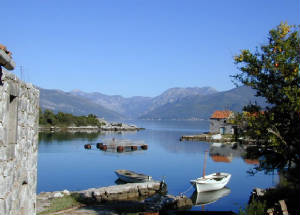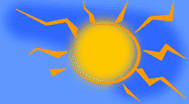|
Lord Byron wrote: "At the moment of the creation of our planet, the most beautiful merging of land and
sea occurred at the Montenegrin seaside...…When the pearls of nature were sown, an a abundance of them were strewn all
over this area...…"

Located
in the southern Europe (the Mediterranean region) Montenegro covers area of 13.812 sq.km
and has a population of about 662.000. Its principal city is Podgorica and its capital is Cetinje. Traffic connections: the
Podgorica and Tivat international airports, the ports of Bar and Kotor, the Bar-Bari and Bar-Ancona ferryboat and shipping
lines, the Bar -Belgrade railway and the Adriatic Highway. The length of coastline is 299 km, with 117 beaches totalling 73 km
in length. Climate is Mediterranean. Average air temperature in summer is 24.4'C. Maximum
temperature of the sea is 27.1'C. Average number of sunny days per year is 240. Bathing season lasts 180 days. Sea colour
is dark/blue. Sea transparency is 38-56m.
This
comparatively small area is blessed by exceptionally varied and beautiful scenery, historical sites and for the most of the
year a sunny climate. It is a land full of contrasts. Over a span of only 100 km in a straight line, three natural environments
are distinguishable: the seaside, the karst field zone and the high mountain region.

Maritime, middle
and mountain-valley region.
Maritime region is stretched from Krivosija in North to St. Nicholas Island in the South.
This region is characterised by long, hot summer, mild short winter characterise, in which the average air temperature is
around 18 o C . The most sandy and best beaches in the Adriatic are the feature of the Montenegro Riviera. The total length of beaches is around
52 km, with approximately 1.5 million m 2 .
Major industry in this region is above all tourism, and then the maritime
industry.
Major cities and towns in the Maritime region are:
Herceg Novi, Tivat, Kotor, Budva, Bar, Ulcinj.

Region of Middle
Montenegro
Region of Middle Montenegro is the most southern part of the karst region, and is located between Trebesnjica, Montenegrin Riviera,
Lake of Skadar
and Mount of Golija, Vojnik, Lukavica and Manganik. The transition between the maritime and karst regions makes two most famous
Montenegrin plains – Plain of Zeta and Plain of Bjelopavlici.
This region presents the industrial zone of Montenegro.
Major cities of the Middle Montenegro: Podgorica, Cetinje, Danilovgrad, Niksic.

Mountain-Valley
Region
Mountain-Valley Region includes the northern, north-eastern and central part of Montenegro. In this region, the Dinara Mountains reach
the highest height, which are intersected by a network of river valleys.
In addition to very favourable conditions for
development of mountain and attractive tourism, this region has various economic and agricultural resources.
Major
cities of the Mountain-Valley Region of Montenegro:
Zabljak, Berane, Rozaje, Pljevlja, Bijelo Polje, Plav,
Kolasin, Mojkovac

Thus, the tourist has the
possibility of taking swim in the lakes or in the sea, rafting down the river and skiing on the mountain slopes - all in one
day. It takes only three hours by car from the warm Mediterranean climate with over 2,700 hours of sunshine a year to snow-clad
skiing grounds up in the mountains.

Exotic tropical trees grow not far from Alpine plants.
The 300 km of the Adriatic coastline is a jewel in Montenegro's crown of natural beauties.
Beaches are sandy, pebbly and rocky. Several kilometres or just a few scores of meters long. Away from the residential area
or in it, right in front of your hotel. There are beaches in bays, on rocky shores, near olive groves, fields or pine waves.
Some overlook the open sea; some are sheltered in coves. Some have all the facilities required for the comfort of tourists;
the others are wild, isolated, and accessible by boat only.

|










